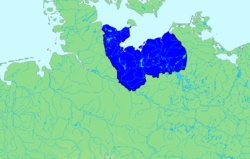Osterabtrezi
| Obotrite confederacy | ||||||||||||||||||||
|
||||||||||||||||||||
|
Coat of arms of
House of Nikloting |
||||||||||||||||||||
| Capital | Veligrad / Veligard (Michelenburg) | |||||||||||||||||||
| Languages | Polabian language | |||||||||||||||||||
| Religion | Slavic paganism | |||||||||||||||||||
| Government | Monarchy (Principality) | |||||||||||||||||||
| Prince | ||||||||||||||||||||
| • | ?–ca. 795 (first) | Witzlaus | ||||||||||||||||||
| • | 1160–1167 (last) | Pribislav | ||||||||||||||||||
| History | ||||||||||||||||||||
| • | Formed | 8th century | ||||||||||||||||||
| • | Accepted Saxon suzerainty | 1167 | ||||||||||||||||||
|
||||||||||||||||||||
| Today part of |
|
|||||||||||||||||||
The Obotrites (Latin: Obotriti) or Obodrites (Polish: Obodrzyce meaning: at the waters), also spelled Abodrites (German: Abodriten), were a confederation of medieval West Slavic tribes within the territory of modern Mecklenburg and Holstein in northern Germany (see Polabian Slavs). For decades, they were allies of Charlemagne in his wars against the Germanic Saxons and the Slavic Veleti. The Obotrites under Prince Thrasco defeated the Saxons in the Battle of Bornhöved (798). The still heathen Saxons were dispersed by the emperor, and the part of their former land in Holstein north of Elbe was awarded to the Obotrites in 804, as a reward for their victory. This however was soon reverted through an invasion of the Danes. The Obotrite regnal style was abolished in 1167, when Pribislav was restored to power by Duke Henry the Lion, as Prince of Mecklenburg, thereby founding the German House of Mecklenburg.
The Bavarian Geographer, an anonymous medieval document compiled in Regensburg in 830, contains a list of the tribes in Central Eastern Europe to the east of the Elbe. The list includes the Nortabtrezi (Obotrites) - with 53 civitates. Adam of Bremen referred to them as the Reregi because of their lucrative trade emporium Reric. In common with other Slavic groups, they were often described by Germanic sources as Wends.
...
Wikipedia


